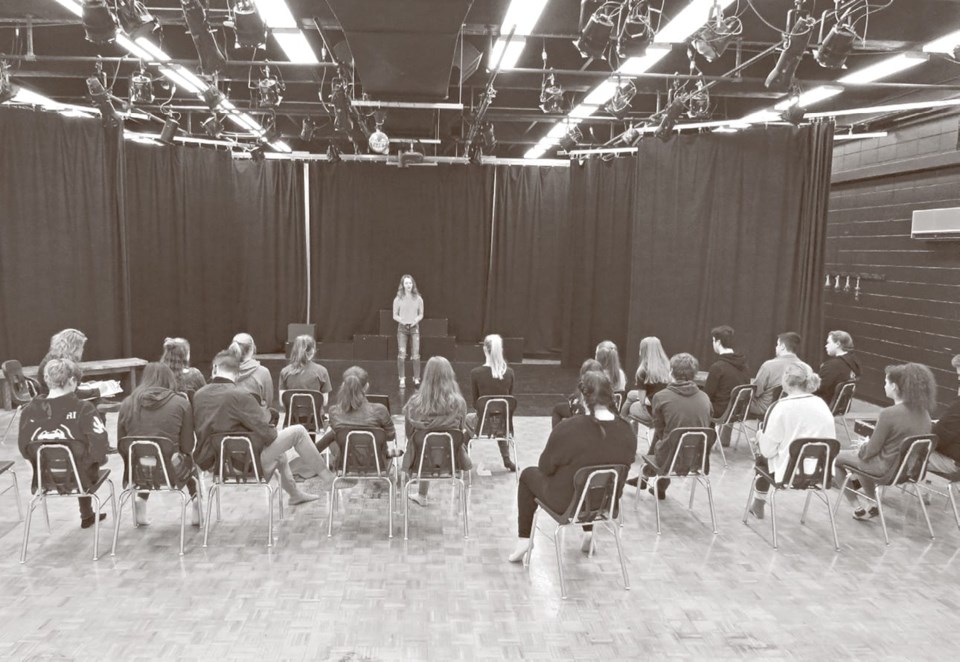Crossley drama students create show on Pelham development; performance set for January 23
BY SAMUEL PICCOLO The VOICE
Last Friday morning, Jennifer Benson’s senior drama class at E.L. Crossley Secondary School was rehearsing for an upcoming performance. Benson, who has taught drama for many years, was preparing her students for, “The Greatest Show From the Smallest Town,” a mishmash of monologues on the subject of development that will be on stage January 23. (The performance will be open to the public, and take place at the high school.)
“At the beginning of the year, we had a class where we wrote down all of our fears,” said Rachelle Tunikaitis, a Grade 12 student. “One of the biggest things was change. So we all went out and interviewed someone in the community to get their thoughts on the change and development that’s happening in town, and then wrote scenes and monologues partly on what we heard.”
Evidently, the students heard a great deal of hostility to development, and just as much to the politicians who have been proponents of it. The first to perform for the class talked about how the town’s “perfect complexity” had been destroyed, “just because you needed to build a few more houses.”
“What’s with all these chain restaurants?” asked Kira Neuman, the second to present. “We have three different Tim Hortons on the same road. Does this town need to be more caffeinated?”
One by one, the students volunteered, were cajoled, or were forced to leave their chairs and speak standing in front of dark curtains on a black sheet of material covering the room’s parquet floor. The students had left their shoes piled by the entrance, and walked around in their socks. Benson offered words of encouragement as the kids steadied themselves.
“Know what you need to say, and say it with commitment,” she said. “No one else is here—pretend that you’re just facing your imaginary acting partner.”
“Does that mean that we can face the wall?” called out one girl. The class laughed.
“No, no,” said Benson. “Plant your feet, relax, and step into it.”
The class clapped enthusiastically, even when the performance had not gone as planned. Part way through her monologue, which was told from the point of view of someone too distracted to notice the town changing around her, Rachael Tunikaitis forgot the words. Her eyes began to well up, and she had to leave the room.
“Well, I cry all the time,” said Tunikaitis later. “But I'm more comfortable crying here. We’re not as worried about embarrassing ourselves in this class.”
Benson concurred.
“We try and make this a safe and caring place,” she said. “During public performances, that safe space isn’t there—it takes real courage, and that’s the true joy and excitement.”
Some of the students were visibly confident. Abigail Shatford breezed through her piece without stumbling, despite the cold she claimed to be nursing. Her character confessed to living in the past.
“It was a time when we didn’t have much knowledge, but we had a lot of wisdom…Now, enough is never enough,” she said.
When Shatford finished, Benson directed her to go behind the curtain and sit at the piano.
“Abigail wrote a song-a-logue too,” she announced. “Now go behind there and practise it.” Shatford put up a meagre resistance and then moved behind the curtain, from where faint tappings on a silenced keyboard could be heard while the others finished up.
Alex Sykes, a member of the school’s improv team, rolled through his speech with only a few brief pauses.
“All cities share a feeling of loneliness,” he mused. “People walking up and down with earbuds in, listening to music…We need to say hi to that random stranger.”
Suspicion of cities was a common sentiment in the students’ monologues, though it was not universal. One, professing having no problem with development, but objecting to the possible increase of taxes, sounding convincingly like a grown-up.
Other monologues sounded curiously like the character speaking was a teenager.
“I don’t really care [what happens to the town],” concluded one. “I’m moving away. My future is too big for this town.”
And some were fatalistic.
“Development is going to happen anyway,” one girl said. “So let’s look at the bigger picture. Things are going to change, and you’re going to have to deal with it.”
At various points in their speeches, nearly every student called out “line,” prompting someone following along with a copy of the text to give them the next word.
Sometimes this one word was not enough, and the students would again say “line” and strain their faces, trying to remember. Benson gave them a few shots at this before suggesting that they read from their papers.
“Sorry,” the students would say meekly, to which Benson invariably replied, “Don’t be sorry, it’s all right.”
John Avery, who is six foot seven and likes to make jokes, apologized to the class in advance for the content of his monologue. “Sorry, there’s two swear words in it,” he said.
“Well, we’ll have to cut that out for the performance night,” said Benson, who intends to have the class splice bits from each monologue next week in preparation for the January 23 show. “We won’t be able to present that to the parents.” Avery smiled sheepishly and agreed.
After the final student had been squeezed from her seat, Benson pulled back one of the stage curtains to reveal Abigail Shatford seated at the keyboard.
“Okay Abigail—you’ve got three minutes before the bell. Go ahead.”
Shatford put up another brief bout of resistance before resigning herself to playing. She said later that she had written the song before the development assignment, though the sentiment expressed in the lyrics was similar to that of her monologue.
“This town, it means everything to me,” she sang forcefully.
And then, more as a lament, she repeated a refrain. “What happened to my town?”



